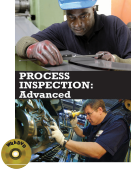Trade and Industrial Education

Process Inspection: Advanced comprehends various diverse practical and visual skills with knowledge of specialized materials and techniques. An inspection is, most generally, an organized examination or formal evaluation exercise. Inspections may be a visual inspection or involve sensing technologies such as ultrasonic testing, accomplished with a direct physical presence or remotely such as a remote visual inspection, and manually or automatically such as an automated optical inspection. This book will introduce the knowledge and skills for those studying and/or working in manufacturing industry to interpret and convey information in response to workplace requirements.
About this Book
The information in this book consists of basic to core competencies that a person must achieve to apply quality systems, conduct product and or process capability studies and maintain and supervise the application of quality procedures. These competencies cover improving the quality system, and collecting and summarizing data to support the quality improvement process. The data would be used to produce statistical information such as averages and ranges, and charts such as tally, run or control charts.
About the Manufacturing Inspection Industry
Inspection in manufacturing includes measuring, examining, testing, or gauging one or more characteristics of a product or process and comparing the results with specified requirements to determine whether is the requirements are met for each characteristic. Common examples of inspection by measurement or gauging include using a caliper or micrometer to determine if a machined dimension of a manufactured part is within the dimensional tolerance specified in a drawing for that part, and is thus acceptable for use. Inspections may be a visual inspection or involve sensing technologies such as ultrasonic testing, accomplished with a direct physical presence or remotely such as a remote visual inspection, and manually or automatically such as an automated optical inspection. Quality inspectors are responsible for assuring that manufactured items are made and assembled correctly. They also make sure that the products meet government standards and safety regulations. Quality inspectors’ work with manufacturing professionals during the production process, often approving the quality of raw materials before manufacturing begins. When production is completed, quality inspectors are responsible for a final in-depth inspection, before signing off and approving the product. More importantly, quality inspectors find the faults in both materials and the manufacturing process. Correcting those faults ensures a better finished product for prospective consumers. When a product is completed, a quality inspector tests the performance to determine if it meets manufacturer and industry standards. If a product does not meet specific standards, recommendations are made to improve the quality of a product. Besides having an understanding of the product or service, a quality inspector must also be adept at the tools of the trade. Because many industry standards depend on weights and measurements, a variety of calibration tools may be necessary. Educational requirements to become a quality inspector vary, depending on the industry. While some employers require only a high school education, others demand extensive post-secondary education and training. Demand for quality control inspectors is likely to increase by six percent between 2012 and 2022, according to Bureau of Labor and Statistics. In 2013, the BLS reported the average salary for inspectors, testers, sorters, samplers and weighers was $18.20 per hour or $37,860 annually.